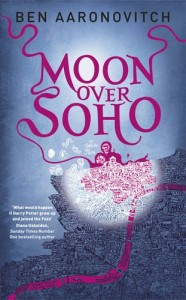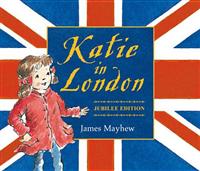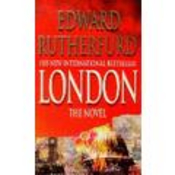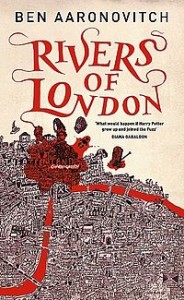 Rivers of London has been on my list for a while, not least because the husband has read and enjoyed all four of the PC Peter Grant books that have been published so far, and thus they have been available to me for a while. Towards the end of last week I found myself unenthused with the books I’d been planning to read during Bout of books, and someone, somewhere mentioned Aaronovitch, and it occurred to me that as we are going to London in just a few weeks, this might just be the perfect time to read them.
Rivers of London has been on my list for a while, not least because the husband has read and enjoyed all four of the PC Peter Grant books that have been published so far, and thus they have been available to me for a while. Towards the end of last week I found myself unenthused with the books I’d been planning to read during Bout of books, and someone, somewhere mentioned Aaronovitch, and it occurred to me that as we are going to London in just a few weeks, this might just be the perfect time to read them.
In one way it certainly was, Aaronvitch has his story firmly grounded in place and reading this without imminent plans of visiting the city would be frustrating, to say the least.
In Rivers of London PC Peter Grant is coming to the end of his probationary period and is hoping to be assigned to real detective work. His friend, and crush, Lesley May is at the same point in her career. The wikipedia entry sums up their superior officers’ view of the two neatly: Lesley is «expected to go far», Peter is «expected to do paperwork». That is, until they are on watch to guard a murder scene from the general public, and while Lesley pops off to buy coffee and Peter meets a ghost who claims to have witnessed the murder. When their assignments are handed out, Peter finds himself assigned to a generally studiously ignored branch of the Met, the section that deals with magic and the supernatural. His superior officer, Detective Chief Inspector Thomas Nightingale has been the sole employee of this section, and Peter finds himself sworn in as the first apprentice wizard in fifty years, and lodged in The Folly, the section’s headquarters, which is clearly dimensioned for a rather larger contingent.
There follows a tale of riotous rebellion and magic, where Peter finds himself trying to solve two very different «cases». One is the murder that starts the book off and those that follow in a grisly, yet inventive, serial killing spree, the other is a conflict between Mother and Father Thames, the river gods, and their children (the tributaries) and entourage.
Aaronvitch draws on history, mythology and folklore, picking both famous and obscure pieces and sewing them neatly together to form a coherent whole which spellbinds the reader (well, this reader, anyway). There are explicit, if ironic, echoes of Dr Who (which Aaronvitch has written for) and Harry Potter, but I was also reminded of Neil Gaiman’s Neverwhere and of Jasper Fforde’s novels, the latter especially in the way Aaronvitch’s minor characters all beg for a google search. Take Isis, also known as Anna Maria de Burgh Coppinger, wife of Father Thames’ son Oxley: Google her, and you find that there is probably at least another novel there, just in her life story. I love this stuff. And then you have the famous dudes:
Beyond the booth, flanked by two neoclassical pillars, was a marble statue of a man dressed in an academic gown and breeches. He cradled a mighty tome in one arm and a sextant in the other. His square face held an expression of implacable curiosity, and I knew his name even before I saw the plinth, which read: Nature and nature’s laws lay hid in night; God said ‘Let Newton be’ and all was light. Nightingale was waiting for me by the statue. ‘Welcome to the Folly,’ he said, ‘the official home of English magic since 1775.’ ‘And your patron saint is Sir Isaac Newton?’ I asked. Nightingale grinned. ‘He was our founder, and the first man to systemise the practice of magic.’ ‘I was taught that he invented modern science,’ I said. ‘He did both,’ said Nightingale. ‘That’s the nature of genius.’
The inclusion of Newton is another thing I like about Aaronvitch’s universe, though magic is magic Peter takes the scientific approach, and the answers he comes up with seem to confirm his instincts; even magic depends on physical laws.
I like Peter Grant. He’s a good guy, and may even have the makings of a good cop, even if he is too easily distracted. I like Lesley May, too, and I especially like how Peter and Lesley are portrayed as friends. Even if there is an element of «this might progress to more than friends at some point», you still get the feeling that they are friends first and foremost and that they will remain so whether progression happens or not.
Then there’s the language, and the linguistic relation to time and place:
Neither of us could face the horrors of the kitchenette that morning, so we found shelter in the station canteen. Despite the fact that the catering staff were a mixture of compact Polish women and skinny Somali men, a strange kind of institutional inertia meant that the food was classic English greasy spoon, the coffee was bad and the tea was hot, sweet and came in mugs.
There’s plenty for a hopeless anglophile to «squee» about, there is wit and dry humour and there is, occasionally, something akin to slapstick. There are blink-and-you-miss-them cultural references by the score.
Would it kill us to have an official branch of government that handled the supernatural?’ ‘A Ministry of Magic?’ I asked. ‘Ha-bloody-ha,’ said Tyburn.
Where the novel falls short is in emotional engagement. Yes, I like Peter, and I certainly root for him, and I am gripped to the point of considering sneaking off to a quiet corner at work to polish off the last 50 or so pages when the bus ride yesterday morning proved too short for the task. However, the perfect book is the book that puts me in the emotional quandry of wanting to get to the end to see what happens but also wanting the book to last forever. Rivers of London fullfills the first, but not the second. I will allow that there is a chance that I will feel differently at the end of book four, when the prospect of having to wait for another installment starts looming large. I’ll get back to you on that. I’ve already started on book two.
Aaronovitch has a blog: Temporarily Significant, and there is also a website for the series: The Folly.
———————
Så vidt jeg kan se har ingen norske forlag (eller svenske, for den saks skyld) grepet fatt i Ben Aaronvitchs bøker. Det er synd, for selv om en forkjærlighet for London og Britisk humor, historie og mytologi sannsynligvis er et pluss for lesere av disse bøkene er det jo ikke slik at sånne preferanser nødvendigvis følges av engelskkunnskaper gode nok til å lese firehundresiders romaner i orginal. Oppfordringen er klar: Oversett disse!
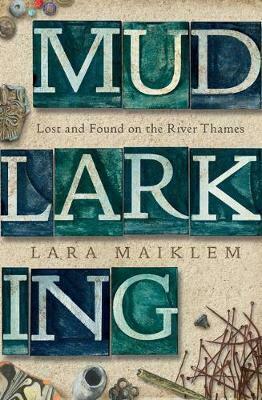 Jeg husker ikke hvor og når jeg kjøpte Mudlarking, jeg tror kanskje det kan ha vært i London, faktisk, og det er jo i så fall passende. En «mudlark» er en pippisk tingleter, men spesifikt en som leter etter ting langs elvebredden i Themsen, nedenfor tidevannsskillet. Nettopp tidevannet har to viktige effekter for en tingleter. For det første blottlegges en stor del av elvebunnen hver gang det er lavvann – langs en normal elvebredd ville det jo ikke ta så lang tid før alle tingene er funnet og fjernet. Og selv langs Themsen ville det nok blitt utplukket, om de ikke var for den andre effekten: Tidevannet fører til erosjon.
Jeg husker ikke hvor og når jeg kjøpte Mudlarking, jeg tror kanskje det kan ha vært i London, faktisk, og det er jo i så fall passende. En «mudlark» er en pippisk tingleter, men spesifikt en som leter etter ting langs elvebredden i Themsen, nedenfor tidevannsskillet. Nettopp tidevannet har to viktige effekter for en tingleter. For det første blottlegges en stor del av elvebunnen hver gang det er lavvann – langs en normal elvebredd ville det jo ikke ta så lang tid før alle tingene er funnet og fjernet. Og selv langs Themsen ville det nok blitt utplukket, om de ikke var for den andre effekten: Tidevannet fører til erosjon.